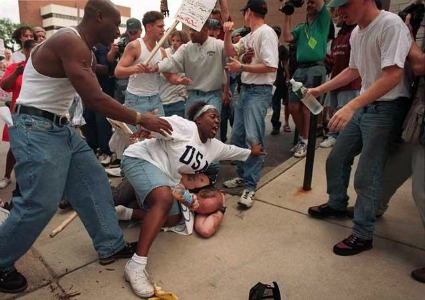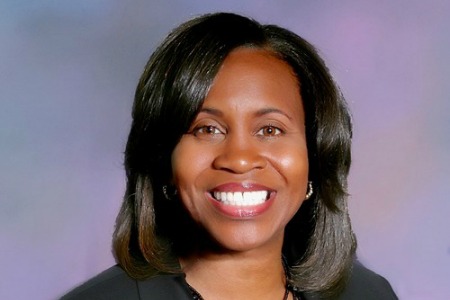
Keshia Thomas (pictured below center), a Black woman who protected a White man at a Ku Klux Klan rally back in 1996, recently recalled her act, according to BBC News.
“I knew what it was like to be hurt,” Thomas said. “The many times that, that happened, I wish someone would have stood up for me.”
Thomas was 18 years old, when Klansmen decided to hold a rally in Ann Arbor, Mich., her hometown. Known for being a heavily liberal and multiracial area, hundreds of residents gathered in a show of force against the group.
Though officers protected the White supremacists with riot gear and protesters were held behind a fence, the rally soon turned hostile. A woman holding a megaphone reportedly noticed a White man among them wearing a confederate T-shirt. She reportedly notified protesters who then proceeded to chase him from the crowd.
Though it’s not known if the man was a Klan member, protesters allegedly yelled, “Kill the Nazi,” before knocking him down. They reportedly began attacking him with wooden sticks from their signs.
For Thomas, the situation had clearly gotten out of hand.
“When people are in a crowd, they are more likely to do things they would never do as an individual. Someone had to step out of the pack and say, ‘This isn’t right.'” she said.
Consequently, Thomas threw herself over the man, protecting him from further harm.
Then-student photographer Mark Brunner, who witnessed Thomas’ actions, was amazed.
“She put herself at physical risk to protect someone who, in my opinion, would not have done the same for her,” he said. “Who does that in this world?”
According to Thomas, “Violence is violence — nobody deserves to be hurt, especially not for an idea.” Now in her 30s, Thomas has never heard from the man, but she did have an encounter with someone close to him: Months after the gesture, a man reportedly approached her in a coffee shop and thanked her. When she asked why, he said, “That was my dad.”
Knowing the man had a son put things in even greater perspective for Thomas. “For the most part, people who hurt…they come from hurt. It is a cycle. Let’s say they had killed him or hurt him really bad. How does the son feel? Does he carry on the violence?”
Now living in Texas, Thomas says she is looking toward the future and not her past.
“I don’t want to think that this is the best I could ever be. In life you are always striving to do better.” she said. “The biggest thing you can do is just be kind to another human being. It can come down to eye contact or a smile. It doesn’t have to be a huge monumental act.”



